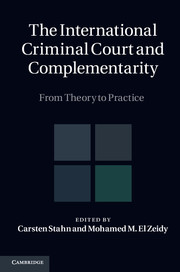Book contents
- Frontmatter
- Contents
- Acknowledgments
- Foreword by HE Judge Sang-Hyun Song
- Foreword by Patricia O’Brien
- Foreword by Silvia A. Fernandez de Gurmendi
- List of abbreviations
- Introduction: bridge over troubled waters?
- PART I General reflections
- PART II Origin and genesis of complementarity
- PART III Analytical dimensions of complementarity
- 7 Complementarity as global governance
- 8 Policy through complementarity: the atrocity trial as justice
- 9 Taking complementarity seriously
- 10 International criminal justice in the era of failed states: the ICC and the self-referral debate
- 11 The quest for constructive complementarity
- 12 Reframing positive complementarity
- 13 Too much of a good thing?: implementation and the uses of complementarity
- PART IV Interpretation and application
- PART IV (Continued) Interpretation and application
- PART V Complementarity in perspective
- PART VI Complementarity in practice
- Index
- References
12 - Reframing positive complementarity
Reflections on the first decade and insights from the US federal criminal justice system
from PART III - Analytical dimensions of complementarity
Published online by Cambridge University Press: 05 November 2014
- Frontmatter
- Contents
- Acknowledgments
- Foreword by HE Judge Sang-Hyun Song
- Foreword by Patricia O’Brien
- Foreword by Silvia A. Fernandez de Gurmendi
- List of abbreviations
- Introduction: bridge over troubled waters?
- PART I General reflections
- PART II Origin and genesis of complementarity
- PART III Analytical dimensions of complementarity
- 7 Complementarity as global governance
- 8 Policy through complementarity: the atrocity trial as justice
- 9 Taking complementarity seriously
- 10 International criminal justice in the era of failed states: the ICC and the self-referral debate
- 11 The quest for constructive complementarity
- 12 Reframing positive complementarity
- 13 Too much of a good thing?: implementation and the uses of complementarity
- PART IV Interpretation and application
- PART IV (Continued) Interpretation and application
- PART V Complementarity in perspective
- PART VI Complementarity in practice
- Index
- References
Summary
Though originally developed as a means to protect state sovereignty and limit the powers of an international tribunal, complementarity serves critical gate-keeping and case selection functions in the international criminal justice system. Domestic legal systems have well developed means of determining which cases to prosecute, and allocating such cases among courts and tribunals within the system. This chapter revisits the case selection and gate-keeping functions of complementarity through a comparative consideration of mechanisms used to solve similar problems by domestic judiciaries, particularly the US federal judicial system. In so doing, the chapter raises theoretical questions about the purposes and functions of international criminal justice as well as the technical implications of those theoretical choices. The chapter suggests ways that complementarity can be used to allow international criminal tribunals to do better triage, by screening out some cases and striking cooperation agreements or other plea bargains in many more. The chapter suggests how a new theoretical take on complementarity can improve gate-keeping and case selection, plea bargaining and caseloads in the international criminal justice system.
Introduction
Immediately upon assuming office in 2003, International Criminal Court (ICC) Prosecutor, Luis Moreno-Ocampo, stated: ‘As a consequence of complementarity, the number of cases that reach the Court should not be a measure of its efficiency. On the contrary, the absence of trials before this Court, as a consequence of the regular functioning of national institutions, would be a major success’. The Prosecutor's statement embodies what has been described as positive or proactive complementarity, according to which the Office of the Prosecutor (OTP) would encourage national governments to undertake their own investigations and prosecutions of crimes within the Court's jurisdiction. Consistent with the Prosecutor's statement, one could have imagined the ICC training judges in the Democratic Republic of the Congo, prodding the Ugandan government to prosecute Joseph Kony in Kampala, or bolstering the independence of the Sudanese judiciary.
- Type
- Chapter
- Information
- The International Criminal Court and ComplementarityFrom Theory to Practice, pp. 341 - 360Publisher: Cambridge University PressPrint publication year: 2011
References
- 6
- Cited by



